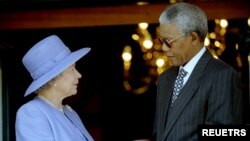For some Africans, Queen Elizabeth II is a reminder of dark times from someone who represented the oppression of the African people, while others honor her for helping end apartheid in South Africa, for instance, in the early 1990's.
Sam Okeke Nwajiugo, at the Nnamdi Azikiwe University told VOA that in Africa's most populous nation, most Nigerians appreciate the late monarch's support during colonial times.
''Currently, most people in Nigeria believe that her (Queen Elizabeth II's) visit in 1956 was a friendly one, by giving the peaceful conclusion of independence in Nigeria (1960). We appreciate her for that," he said, adding "We also appreciate her role in Tanzania (1961), Ghana (1957), and Sierra Leone (1961). These are (some) areas in Africa where we had peaceful struggle for independence'', he said.
The African historian said that despite this, the roadmap to the total liberation of some African countries in the colonial era was unfortunate, noting that had the Queen stepped up, the violence that ensued could have been prevented.
''In other places like Kenya, South Africa, and Rhodesia (now Zimbabwe,) there were cases of violence and many did not like that. Many thought that the Queen should have prevented the violence," Nwajiugo said.
"People believe that she was a nice lady, but her role towards independence in some African states is disturbing'', the analyst added.
Akua Djanie-Manfo, a Pan-Africanist and author of ''African Countries Word Search'' says she is ''disturbed'' by Africans mourning the passing of the British monarch. She told VOA that she's ''disappointed because the fact is that the U.K royal family still live off having colonized black and brown people.''
''Kensington Palace was made from being colonized, the royal family sold the highest number of Africans as slaves'', she said.
''(The Queen) maintained the idea of the British empire being superior than everybody else. That's a continuation of the agenda of her ancestors," she stated, adding "That's her legacy for Africa - she really kept the status quo going. There are so many Queens like the Zulu Queen, the Dutch Queen etc. So, why is it just always about the British Queen?" the Ghanaian-British author queried.
In contrast, Nwajiugo said the Queen's lasting legacy has helped Africans value democracy in most parts of the continent. He added that sanctions that were imposed by the United Kingdom against the racist South African government during the reign of Britain's first female Prime Minister, Margaret Thatcher, as well as her support for embargoes against the Southern African nation during apartheid facilitated an end to that regime.
''The Queen's support was clearly visible when she paid a visit to Nelson Mandela (South Africa's first democratically elected president)'', he said.
The Commonwealth is a political association of 54 member states with the vast majority of its members being former territories of the U.K. The Queen's son now King Charles III has become Head of State among the Commonwealth nations. Per the royal family's website, the entity is not ''hereditary, but by unanimous decision by Commonwealth leaders in 2018, the King becomes Head after the death of Queen Elizabeth II.''
Djanie-Manfo recalled ''learning about the Commonwealth in my 20's, and recently when Jamaica and Barbados wanted to come out, I read about it again. And I saw things like shared interests, peace and security," she said.
"But if you ask me what the firm does for these countries, I'm not able to pinpoint. For instance, Countries like Ghana that are part of the Commonwealth (and) are not better developed, safer or peaceful than non-Commonwealth countries,'' Djanie-Manfo added.
She asserted that ''The King should come out and admit the role his family played in enslaving Africans, and then the Commonwealth leaders should be brave enough to say that you (referring to the royal family) owe us the truth, and schools should learn true history, including return of stolen resources, then let's move forward.''
